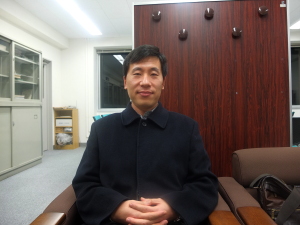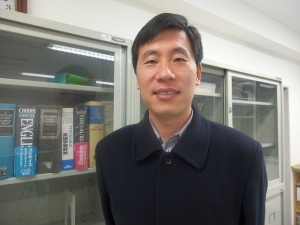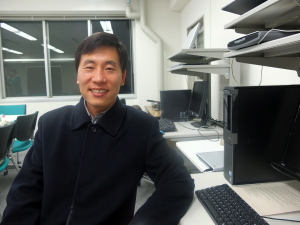Faculty Interview 35
Dong Shao-xin
(National Institute for Advanced Humanistic Studies, Fudan University / Associate Professor)

―― Would you tell me the main topic of your researches?
My main area of studies is history of the relation between China and Europe during the 16th-18th centuries. In this field, there are lots of different topics, for example, Catholic mission, trade and embassies. But now my study is about missionaries and how western cultures were introduced into China, including western medicine, about which I have written a book (2008), European astronomy, geography and European military weapons, etc. All these aspects, and their influences and Chinese responses, are what I’m interested in.
―― Were all these western cultures introduced by missionaries?
Yes. Most of these western cultures were introduced by Jesuits. So the missionaries were almost the only “media” of the cultural intercourse between China and Europe in that period. Therefore most of my studies are about that.
But on the other hand, most of the missionaries from Europe to China spoke or wrote in Portuguese, because of Portuguese Padroado, which means the Portuguese government had the right and power to protect these missionaries in East Asia. All of the missionaries, especially Jesuits, needed to go to Portugal to learn Portuguese before they went to China. Thus most of the primary materials and sources were written in Portuguese. Of course, there are lots of materials written in Latin and French too, but Portuguese materials occupied main parts. So using the Portuguese materials is necessary, but there are very a few Chinese scholars who can read Portuguese materials. That is why translating Portuguese materials into Chinese is very important.
Now I’m interested in Antonio de Gouvea, a Portuguese Jesuit. He wrote a book Asia Exterma(1644). Most of the contents of this book are about history of Catholic mission in China. I want to translate it into Chinese. Another book written by him is about general history of China, from ancient time until Qing dynasty. This is also important because it is Chinese history written from the western perspective.
―― I understood why you are studying about that Jesuit. Through this study, you can explore the relation between China and Europe at that time. Then, I would like to know about why or how you have had interest in this theme.

I think this topic is very important to know better modern China and modern world. Nowadays China has many problems. We need to deal with “tradition and modern” as well as “Western and China”. For example, when Japan is facing western cultures, it seems that it absorbs and accepts them easily. But for China, there are big problems. How to face the West? How to keep our traditions? What is modernization for the Chinese people? Is it westernization? We need to think deeply about these questions. I think, for this purpose, we must go back to history. I think the problems we are just now facing began in 16th century. At that time, how western cultures were introduced into China and how Chinese government and people treated them? We must learn from that.
―― Compare with Japan, in the late 19th century, Japanese government absorbed western cultures with little doubt, I think. On the other hand China has tried to keep their own traditions. I think this is good thing.
We are doing trade with the West and we are accepting lots of high technologies from the West. But, should we also accept western democracy? Should we also accept western religion? Should we also accept western idea of politics?
But the problem is, whether it is good or not to keep our own traditions and what kinds of traditions we should keep. Not all traditions are good. We should select some of them. And also we need to develop new culture. I think it is important to accept some of western ideas and mix some of traditions with them in order to develop a new culture.
―― That is not simply westernization, isn’t it?
Some of western cultures are good, but some of them are not suitable to China. So we need to choose some of them.

―― Your studies focus on Qing period, but you also care about modern China and the relations between China and the West nowadays! Then, which period is more important for your study?
Both of them. My focus is on the intercourse and cultural exchange. That is not limited to particular period. But now I’m studying especially 16th -19th centuries. Because, from this period, western powers went to Asia, and lots of conflicts began to appear. That was first stage of globalization.
―― It is in 16th century that origin of these conflicts of today was!
Yes. From that period East and West began to contact each other directly. The global market appeared. Western national states appeared. In Europe Protestant separated from Catholic Church. Lots of modern problems have their origins in 16th century. Therefore I study about this period.
Chinese culture was introduced into West, and western culture came to China, Japan, and Korea. I also want to explore what happens after these different cultures met each other, and what the difference between China and Japan when both of them face western Cultures.
―― It is in 16th century that origin of these conflicts of today was!
Yes. From that period East and West began to contact each other directly. The global market appeared. Western national states appeared. In Europe Protestant separated from Catholic Church. Lots of modern problems have their origins in 16th century. Therefore I study about this period.
Chinese culture was introduced into West, and western culture came to China, Japan, and Korea. I also want to explore what happens after these different cultures met each other, and what the difference between China and Japan when both of them face western Cultures.
the interviewer’s postscript
In this interview, Dr. Dong explained me very lucidly and kindly. I learned many things from his perspective in which the past history is always linked the modern concerns. Thank you very much! (Tomoka MUSHIGA)

